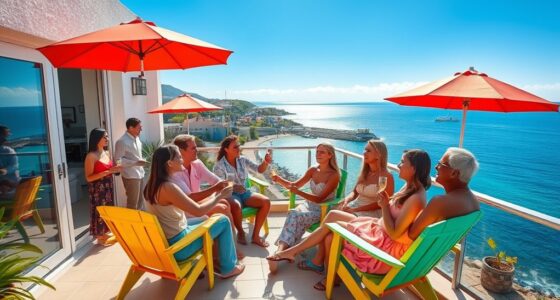Buying property through a golden visa program can often help you qualify for a second passport, provided you meet the country’s investment thresholds and residency requirements. Many nations offer the chance to gain temporary or permanent residence with real estate investments, which can eventually lead to citizenship after fulfilling certain periods and conditions. However, program specifics and legal criteria vary widely. To discover how these options could work for you and what to watch out for, keep exploring beyond this overview.
Key Takeaways
- Purchasing property through a Golden Visa program can lead to temporary or permanent residency rights.
- Continued residence and compliance may eventually qualify investors for citizenship or a second passport.
- Investment thresholds vary by country, influencing eligibility and pathway to citizenship.
- Legal and regulatory changes can impact property requirements and the ability to obtain a second passport.
- Property investment alone does not automatically grant a second passport; it is part of a broader residency and naturalization process.
Understanding the Structure of Golden Visa Initiatives
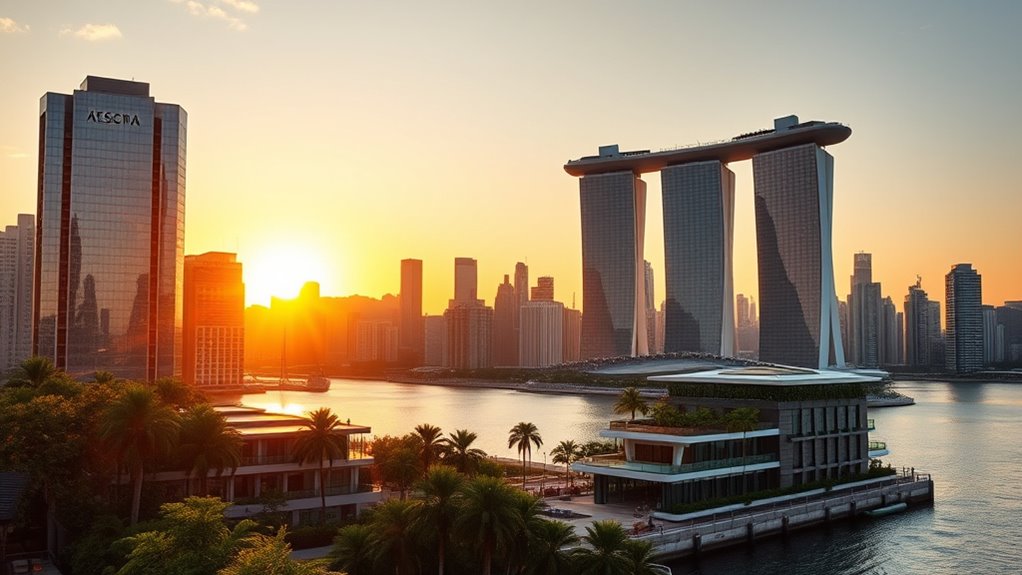
Golden Visa initiatives are established through specific laws or executive orders by national or regional governments, outlining the rules and requirements for participation. These legal frameworks define eligible investments, applicant criteria, and the rights granted, including pathways to residency or citizenship. Regulatory bodies like immigration services oversee application processing, compliance, and enforcement, ensuring adherence to rules. Applicants must pass background checks, AML procedures, and financial due diligence to prove legitimacy. The process involves submitting detailed documentation, such as investment certificates, health insurance proof, and translation of foreign documents, often requiring Apostille legalization. Investment options vary, including real estate or funds, with minimum thresholds and ongoing reporting obligations. Renewal, revocation, or penalties for non-compliance are clearly codified, ensuring the program’s integrity and security. These legal frameworks are periodically updated to reflect changing immigration policies and international standards. Additionally, transparency and regulatory oversight are vital components to maintain trust and program effectiveness, especially as program requirements evolve over time to address global standards.
How Real Estate Investment Facilitates Residency Rights

Investing in real estate is a common pathway to obtaining residency rights under many Golden Visa programs. When you purchase property, it often triggers eligibility for temporary or renewable residence permits. These permits allow you and your family to live, study, and sometimes work in the country. Minimum investment thresholds typically start from €250,000 in countries like Greece and Italy. To maintain your residency, you need to keep the property; selling or abandoning it can jeopardize your status. Many programs also offer travel benefits, such as visa-free access to the Schengen Area for Greece. Family members, including spouses and dependent children, usually gain identical rights, making the investment appealing for whole-family relocation. The process involves submitting documents like proof of investment and valid IDs, with renewal contingent on property maintenance. Proper compliance with immigration regulations is essential to sustain the residency rights gained through property investment. Additionally, understanding the specific property requirements of each program can help ensure a smooth application process.
Comparing Investment Thresholds Across Countries

You’ll notice that investment minimums vary considerably across countries, often reflecting their economic priorities and market conditions. Some nations set lower thresholds to attract more investors, while others require higher amounts to guarantee quality applicants. Understanding these differences helps you evaluate which programs align best with your financial situation and goals. Investment thresholds often influence the competitiveness and appeal of each country’s program, and considering the available Unique and Wicked Planters can inspire creative ideas for property use and enhancement. Additionally, sector performance metrics can provide insights into the stability and growth potential of different real estate markets, aiding investors in making informed decisions. Moreover, implementing software quality assurance metrics into your evaluation process can improve the accuracy and reliability of your assessments.
Investment Minimums Range
Investment minimums for golden visa programs vary widely across countries, reflecting different economic priorities and immigration policies. In the Caribbean and Middle East, minimum investments range from $200,000 in Dominica to around $235,000 or more for fund contributions, with some countries offering citizenship or permanent residency without property purchases. European programs typically require higher investments; Portugal’s minimum is €500,000 for funds, while Greece’s real estate options start at €250,000, with regional variations. The U.S. EB-5 program demands at least $800,000 in targeted areas, rising to $1,050,000 otherwise. Hungary and Greece also offer real estate options at €250,000 to €350,000, with some programs requiring pre-approval or additional investments. Overall, thresholds span from a few hundred thousand dollars to over a million, depending on the country and program. Investment thresholds differ significantly based on the country’s economic policies and visa benefits.
Economic Contexts Influence
Economic development and program diversity considerably shape the investment thresholds set by different countries’ Golden Visa programs. Wealthier or high-GDP nations tend to offer more diverse options beyond real estate, such as government bonds, business investments, and bank deposits. Emerging economies and smaller countries often focus on real estate purchases or non-refundable contributions to funds. As an example, AI-driven decision-making is increasingly used to evaluate investor profiles and streamline application processes. Incorporating sustainable investment practices can also influence program attractiveness and requirements. – EU member states feature various investment types to attract skilled and wealthy individuals. – Caribbean countries provide quick, affordable routes through contributions to stimulate development. – Mature programs impose longer investment retention and stricter due diligence reflecting stronger regulations. Additionally, the sound healing science in some regions emphasizes holistic approaches to health, influencing investment in wellness-related projects and infrastructure. These economic factors influence the minimum investment amounts, required residency periods, and the types of eligible investments, shaping the overall attractiveness and accessibility of each country’s Golden Visa offerings. Economic strength also impacts the level of due diligence and the stability of the programs, making some nations more appealing to cautious investors.
Eligibility Criteria for Property-Based Second Passports
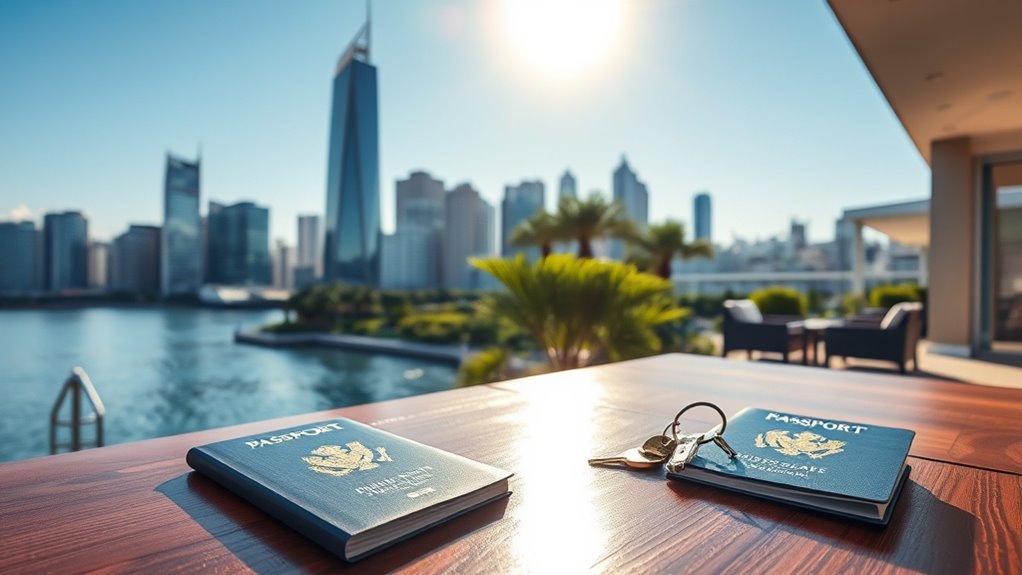
To qualify for a property-based second passport, you must meet specific criteria set by each country. These include minimum investment amounts, property types, and residency requirements. For example, Turkey requires a $400,000 real estate investment without property restrictions, while Malta demands a €300,000 purchase plus VAT. Greece offers options starting at $280,000 for renewable residency. Caribbean nations typically require $200,000–$400,000 investments. Property types vary: Turkey allows residential or commercial, Malta requires property purchase or rental, and Greece demands full ownership. Some countries, like Malta and Portugal, require minimum holding periods or additional contributions. Residency rules differ, with some nations requiring physical presence, others no minimum stay, and citizenship eligibility often after several years.
| Criteria | Details |
|---|---|
| Minimum Investment | Turkey: $400,000; Malta: €300,000; Greece: $280,000 |
| Property Type | Residential, commercial, or land |
| Holding Period | Malta: 5 years; Portugal: 5 years; others vary |
| Additional Investments | Donations or government bonds (Malta, Caribbean) |
| Residency Requirements | No stay needed (Turkey); presence needed (Malta) |
Benefits of Holding a Golden Visa Through Real Estate
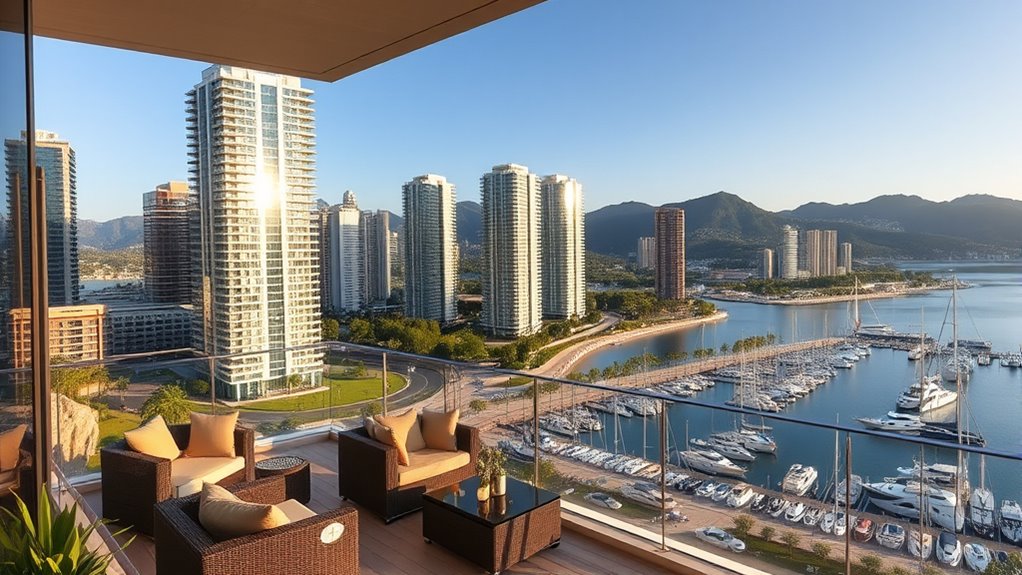
Holding a golden visa through real estate offers you significant flexibility in travel and residency, making it easier to explore new opportunities and enjoy your time abroad. With this visa, you can benefit from visa-free travel within the Schengen area, simplifying international trips. It also grants you the right to live in the issuing country, providing freedom to work and settle as you wish. Additionally, investing in various property types—like apartments or commercial spaces—enables diversification of your portfolio. Many programs include your family, boosting overall mobility. Plus, investing in real estate can offer economic advantages, such as rental income and property appreciation. These benefits combine to create a solid foundation for expanding your global footprint with ease and security. Residency by Investment programs serve as a migration pathway through financial investments, opening up new avenues for international mobility. Furthermore, understanding the real estate market in the target country can help maximize your investment returns and ensure compliance with local regulations. Engaging with private placement memoranda can provide valuable insights into the legal and financial aspects of such investments. A thorough knowledge of property valuation techniques can also assist in making informed purchasing decisions and optimizing your investment strategy.
The Pathway From Residency to Citizenship

After securing a golden visa through real estate investment, many applicants aim to turn their temporary residency into full citizenship. The process involves several steps and requirements. Typically, you must reside in the country for 5 to 7 years, maintaining your investment and fulfilling stay obligations. During this time, you’ll need to prove integration through language skills, cultural knowledge, and community ties. You’ll also gather documents like passports, birth certificates, and background checks. The naturalization process may include interviews, biometrics, and fees. Remember, your continuous investment and legal residency status are essential. Additionally, understanding Hackathons can provide opportunities for networking and skill development that may support your integration process. Here’s a quick overview:
Key Countries Offering Property-Driven Residency and Citizenship
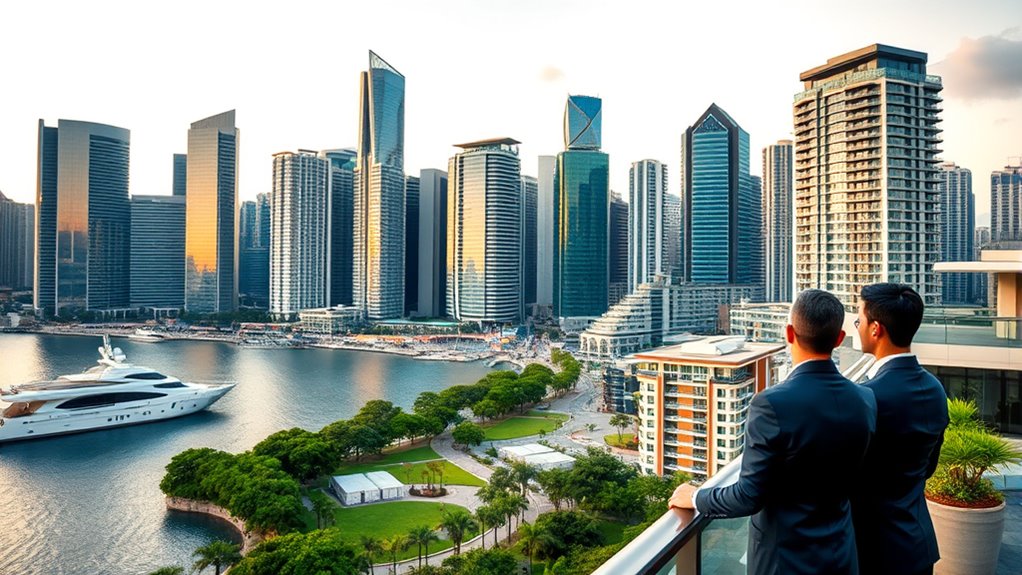
Several countries have established prominent property-driven residency and citizenship programs, attracting foreign investors seeking legal status and broader mobility. These programs often enable you to gain residence or citizenship by investing in real estate, offering benefits like visa-free travel and tax advantages. Countries leading the way include:
Several nations offer property-based residency and citizenship programs with streamlined pathways and attractive benefits.
- Greece: Investment starting at €400,000 for temporary and eventual permanent residency.
- Malta: Both residency and citizenship options, with citizenship through significant investments.
- Portugal: Golden Visa program, granting residency via property investments.
- Spain: Residency through property, with potential citizenship after several years.
- Bulgaria: Residency through property, with pathways to citizenship after fulfilling specific criteria.
These programs are particularly popular because they provide a fast-track route to legal status and international mobility compared to traditional immigration methods, making them highly attractive to global investors. Additionally, understanding the broad eligibility criteria can help investors navigate the application process more effectively.
Risks and Considerations in Property Investments for Visas
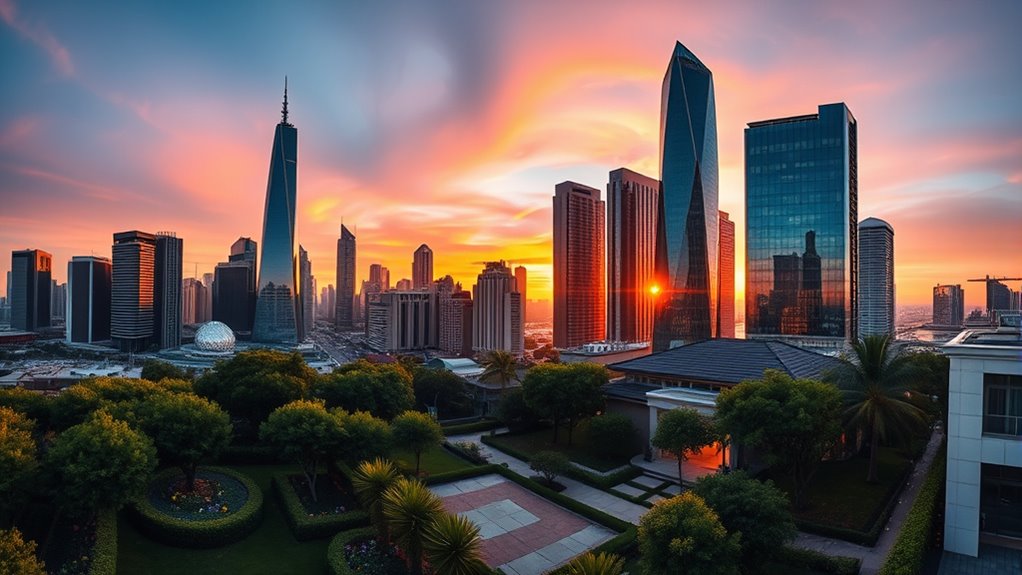
You need to be aware that property investments linked to Golden Visa programs can be affected by market volatility, making returns unpredictable. Regulatory and legal changes in host countries can also alter your investment’s viability unexpectedly. Staying informed and flexible is essential to navigate these risks effectively. Recent policy shifts in countries like Portugal and Spain demonstrate how government decisions can rapidly impact property values and visa eligibility, emphasizing the importance of monitoring political developments.
Market Volatility Risks
Market volatility poses significant risks for property investments tied to golden visa programs, as local market fluctuations and policy changes can quickly erode value. You could face sharp declines if demand drops or regulations tighten. External factors like speculative bubbles and economic downturns further threaten your investment. For example, recent program reductions in Spain and Portugal have caused market corrections. You might also encounter:
- Artificial inflation leading to overvalued properties and potential crashes if foreign demand wanes
- Overconcentration in specific segments, increasing exposure to sector downturns
- Currency and economic shifts that reduce real returns or impact rental income
These risks highlight how unpredictable market conditions and policy shifts can impact your investment’s stability, making careful analysis and diversification essential.
Legal and Regulatory Changes
Legal and regulatory changes can substantially impact property investments linked to golden visa programs, often altering eligibility requirements and investment thresholds without much notice. For instance, Greece increased minimum investments from €250,000 to up to €800,000 in key areas, with stricter zone classifications. Spain maintains a €500,000 minimum but adds options like business investments. Deadlines for meeting previous thresholds can be extended, but rule changes may restrict investor eligibility or property choices. Here’s a snapshot:
| Country | Investment Threshold | Notable Change |
|---|---|---|
| Greece | €250,000 to €800,000 | Increased in urban zones |
| Spain | €500,000 | Added business options |
| Others | Varies | Policy shifts possible |
Stay vigilant: regulatory updates can affect your eligibility, property requirements, and the overall stability of your investment. Legal frameworks are subject to change, which can influence the duration and renewal conditions of your visa status.
Impact of Golden Visa Programs on Local Property Markets
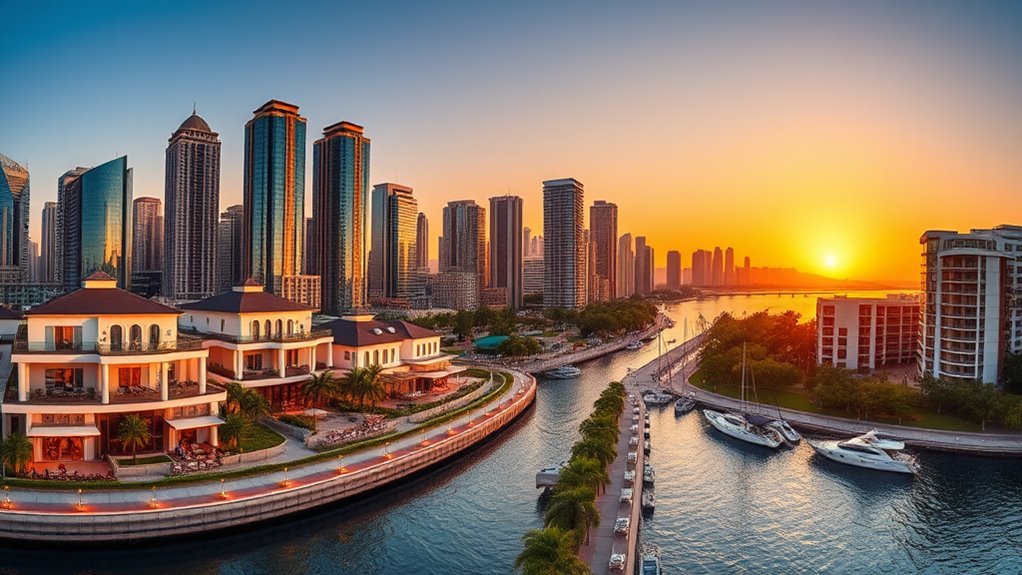
Golden Visa programs substantially influence local property markets by driving up prices and causing market distortions. You’ll notice a surge in property sales near investment thresholds, with sellers strategically adjusting prices—like Portugal’s €500,000 mark—resulting in a “Golden Visa premium” of €38,000 to €50,000. This premium increases upper-end prices by over 10%, mainly driven by non-EU buyers, especially in prime urban areas. These price distortions make housing less affordable for local residents, fueling social tensions and discontent.
- Housing prices in key cities rise, limiting access for locals.
- Foreign investment focuses on high-value properties, skewing market balance.
- Community displacement and gentrification become more prevalent.
Strategic Tips for Navigating Property-Based Immigration Options

Exploring property-based immigration options requires careful planning and thorough understanding of each country’s specific requirements. First, verify the documentation needed, such as passports, background checks, and proof of funds, since inconsistencies can cause delays. Understand ownership options, whether direct, corporate, or trust structures, as they impact taxes and legal protections. Be aware of restrictions, like Türkiye’s bans near military zones, or Greece’s full property rights nationwide.
| Aspect | Key Consideration |
|---|---|
| Investment Thresholds | Varies from $300,000 in the Caribbean to $1.8M in the US |
| Residency Obligations | Ranges from zero minimum stay to minimal presence requirements |
| Ownership Structures | Direct, corporate, or trust; each affects legal and tax planning |
| Documentation & Compliance | Source of funds verification is critical; ensure all paperwork is thorough |
Frequently Asked Questions
Can I Include Family Members in My Property-Based Golden Visa Application?
You can include family members in your property-based golden visa application. Depending on the country, you may add your spouse, children, and sometimes parents or siblings. Make sure they have valid passports, birth or marriage certificates, and clear criminal records. Once you meet all the legal requirements and your application is approved, your family members will gain residency rights, allowing them access to healthcare, education, and travel benefits within the region.
How Long Do I Need to Maintain the Property to Renew My Visa?
You might wonder how long you need to keep your property to renew your visa. Generally, you must maintain continuous ownership and meet the minimum investment threshold. While there’s no strict rule to increase property value, maintaining its original worth is essential. Some programs require occasional visits, but flexibility exists. Remember, renewal typically involves submitting current documentation and proving your investment remains active, often every 1-2 years, to ensure your visa stays valid.
Is It Possible to Get Citizenship Immediately After Acquiring a Golden Visa?
You can’t get citizenship immediately after buying property through a golden visa. Most countries require several years of legal residence before you can apply for citizenship, typically ranging from 5 to 7 years. You’ll need to meet additional requirements like language tests and maintaining your investment. While golden visas grant residence, they don’t provide instant citizenship, so patience and compliance with the residency rules are essential.
Are There Restrictions on Renting Out Property Purchased for a Golden Visa?
Back in the day, renting out property was quite flexible, but now, restrictions have tightened. If you buy property under Greece’s Golden Visa, you can’t rent it out short-term like on Airbnb, as of August 2024. Long-term leases are permitted, but short-term or subleasing isn’t. You must follow these rules closely, or your visa could be at risk. Always stay updated on local laws to avoid penalties.
What Are the Tax Implications of Owning Property Through a Golden Visa Program?
When owning property through a Golden Visa program, you need to contemplate various tax implications. You might owe non-resident income tax on rental income, and some countries impose wealth tax on your assets. If you stay over 183 days, you could become a tax resident, facing broader tax obligations. Be aware of local tax rates, reporting requirements, and treaties that can affect your overall tax liability.
Conclusion
Imagine opening a door with a key made of your property investment, revealing new horizons and opportunities. Golden visa programs let you access that door to a second passport, turning bricks and mortar into a gateway for your future. By understanding the rules and carefully choosing your investment, you can step confidently into a world of global mobility and security. Your journey begins with the right property—ready to turn dreams into a tangible, lasting legacy.




